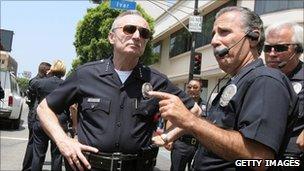England riots: Theresa May defends approach to policing
- Published
Theresa May: "We need to learn lessons from those who have had experience of dealing with gangs"
Home Secretary Theresa May has defended the government's handling of police over riots in England, saying it was clear the public wanted "tough action".
"Ministers must ensure the police know what the public expect of them," she told the BBC.
Acting Met chief Tim Godwin had accused MPs of "inconsistency of guidance", and other officers were uneasy at US expert Bill Bratton advising ministers.
Extra police are still on city streets, and the weekend has seen no unrest.
Weekend court sittings are continuing in London and Birmingham to hear the latest cases of more than 1,200 people charged since violence flared last weekend.
Among those appearing before Birmingham magistrates were Joshua Donald, 26, and a 17-year-old boy, charged with the murders of three men hit by a car during disruption in the city. A third man, Adam King, 23, has also been charged and will appear in court on Monday.
West Midlands Police said about 5,000 people attended a peace rally on Sunday afternoon in Winson Green, the neighbourhood where the men were killed.
Tariq Jahan, the father of 21-year-old Haroon Jahan, said: "Seeing everyone here gives me strength in my heart. He didn't die in vain and I hope this community will remember them."
Meanwhile, politicians and senior police officers continue to be at odds over the handling of public disorder.
Tactical switch
Mrs May said it was clear the police had to change tactics after rioting spread across London - and to other cities - on Monday night.
"I was as concerned as the public were about the scenes we saw of people being able to loot without anything appearing to happen to them," she said.
"They wanted to see more police on the streets but also tough action to go in and arrest people, and actually that's what the police started to do."

Bill Bratton (left) is credited for cutting crime after the 1992 LA riots
Mr Godwin, Metropolitan Police acting commissioner, had earlier rejected suggestions officers were too "timid" and accused Parliament of offering "inconsistency of guidance" related to tackling public disorder.
"We sometimes are accused of excessive force and then we're accused of not being forceful enough," Mr Godwin said.
Police chiefs have previously said the restoration of calm, after police numbers on the streets of London were increased from 6,000 to 16,000 on Tuesday, had nothing to do with political intervention.
Some have also expressed scepticism over plans for Mr Bratton to advise the government.
'Different styles'
The government said Mr Bratton, who is credited with restoring law and order in Los Angeles after riots in 1992, is to be consulted as part of a process of learning from international experts on tackling gang culture.
Association of Chief Police Officers' head Sir Hugh Orde told the Independent on Sunday, external: "I am not sure I want to learn about gangs from an area of America that has 400 of them.
"If you look at the style of policing in the States, and their levels of violence, they are fundamentally different from here," he said.
BBC home affairs correspondent Danny Savage said it appeared ministers and chief officers had reached the same conclusion that they had had to "flood the streets" with police at the same time.
But he added: "There still seems to be a public rift between what the government are doing to deal with this issue and what the police are seeing as a bit of an insult to them."
Shadow justice secretary Sadiq Khan said ministers should show "humility", and warned against politicians interfering in operational matters.
"I think it's a bit rich... Some politicians have come back from holiday and taken the credit for the riots stopping and things improving but aren't willing to take responsibility for when things go wrong and blame the police."
Police numbers
Mr Khan called on ministers to reverse police budget cuts, which chief officers claim will lead to a reduction of 16,000 frontline officers in England and Wales.
"We know how [the rioting] stopped was having police officers on the street.
"I'll say to Theresa May and the prime minister, you need to wake up and listen to what the experts are saying but also, more importantly, what our citizens are saying as well."
Speaking at the peace rally in Birmingham, West Midlands Chief Constable Chris Sims said: "I do see some of the politics that have been going on and some of the alleged disagreements that have taken place as barely relevant to what's going on."
In other developments related to last week's trouble in London, the East and West Midlands, Manchester, Liverpool and Gloucester:
The killers of a man shot dead in Croydon, south London, on Monday are believed to have been involved in looting, detectives have said. Three men have been arrested over the murder of 26-year-old Trevor Ellis
A 33-year-old man has become the fourth person arrested in connection with a fire that destroyed the family-run Reeves Furniture store during the violence in Croydon
A 15-year-old South Tyneside boy has become the latest to be arrested on suspicion of incitement to commit damage through comments posted on Facebook
Scotland Yard revealed that 1,401 people had now been arrested in connection with the unrest, and 808 charged